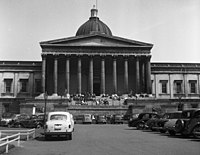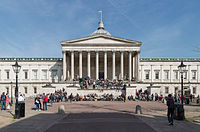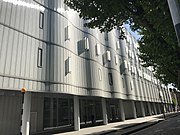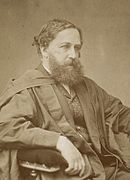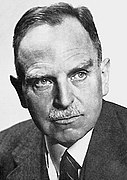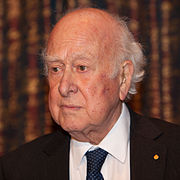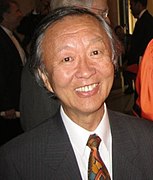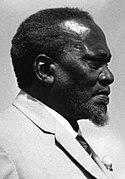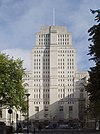University College London
 | ||||||
| Latin:Collegium Universitatis Londinensis[1] | ||||||
Other name | UCL | |||||
|---|---|---|---|---|---|---|
Former names | London University (1826–1836) University College, London (1836–1907) University of London, University College (1907–1976) University College London (1977–2005; remains legal name) | |||||
| Motto | Latin:Cuncti adsint meritaeque expectent praemia palmae | |||||
Motto in English | Let all come who by merit deserve the most reward | |||||
| Type | Publicresearch university | |||||
| Established | 1826 (University status 2023) | |||||
| Endowment | £156.8 million (2023)[2] | |||||
| Budget | £1.933 billion (2022/23)[2] | |||||
| Chair | Victor L. L. Chu[3] | |||||
| Visitor | Sir Geoffrey Vos (asMaster of the Rollsex officio)[4] | |||||
| Chancellor | Anne, Princess Royal (as Chancellor of theUniversity of London) | |||||
| PresidentandProvost | Michael Spence | |||||
Academic staff | 9,585 (2021/22)[5] | |||||
Administrative staff | 6,075 (2021/22)[5] | |||||
| Students | 46,830 (2021/22)[6] | |||||
| Undergraduates | 23,800 (2021/22)[6] | |||||
| Postgraduates | 23,030 (2021/22)[6] | |||||
Other students | 895 (studying wholly overseas; 2021/22) | |||||
| Location | London,England 51°31′29″N00°08′01″W/ 51.52472°N 0.13361°W | |||||
| Campus | Urban | |||||
| Colours | Purpleandblue celeste[7] | |||||
| Affiliations | ||||||
| Website | ucl | |||||
University College London(branded asUCL[8][9][10]) is apublicresearch universityinLondon,England. It is amember institutionof thefederalUniversity of London,and is the second-largestuniversity in the United Kingdom by total enrolment[11]and the largest by postgraduate enrolment.
Established in 1826 asLondon University(though without university degree-awarding powers) by founders inspired by the radical ideas ofJeremy Bentham,UCL was the first university institution to be established in London, and the first in England to be entirely secular and to admit students regardless of their religion.[12][13]It was also among the first university colleges to admit women alongside men in 1878, two years afterUniversity College, Bristol.[14]Intended by its founders to beEngland's third university,politics forced it to accept the status of a college in 1836, when it received aroyal charterand became one of the two foundingcolleges of the University of London,although it achievedde factorecognition as a university in the 1990s and formal university status in 2023. It has grown through mergers, including with theInstitute of Ophthalmology(in 1995), theInstitute of Neurology(in 1997), theRoyal Free HospitalMedical School (in 1998), theEastman Dental Institute(in 1999), theSchool of Slavonic and East European Studies(in 1999), theSchool of Pharmacy(in 2012) and theInstitute of Education(in 2014).
UCL has its main campus in theBloomsburyarea ofcentral London,with a number of institutes and teaching hospitals elsewhere in central London and has a second campus,UCL East,atQueen Elizabeth Olympic ParkinStratford,East London. UCL is organised into11 constituent faculties,within which there are over 100 departments, institutes and research centres. UCL operates several museums and collections in a wide range of fields, including thePetrie Museum of Egyptian Archaeologyand theGrant Museum of Zoology and Comparative Anatomy,and administers the annualOrwell Prizein political writing. In 2022/23, UCL had a total income of £1.93 billion, of which £527 million was from research grants and contracts.[2]The university generates around £10 billion annually for the UK economy, primarily through the spread of its research and knowledge (£4 billion) and the impact of its own spending (£3 billion).[15]
UCL is a member of numerous academic organisations, including theRussell Groupand theLeague of European Research Universities,and is part ofUCL Partners,the world's largestacademic health science centre.[16]It is considered part of the "golden triangle"of research-intensive universities in southeast England.[17]UCL has publishing and commercial activities including UCL Press,UCL Businessand UCL Consultants.
UCL has many notable alumni, including the founder of Mauritius, the first Prime Minister of Japan, one of the co-discoverers of the structure ofDNA,and the members ofColdplay.UCL academics discovered five of the naturally occurringnoble gases,discoveredhormones,invented thevacuum tube,and made severalfoundational advancesin modern statistics. As of 2022[update],30 Nobel Prize winners[18]and threeFields medallists[19]have been affiliated with UCL as alumni or academic staff.
History[edit]
1826 to 1836 – London University[edit]
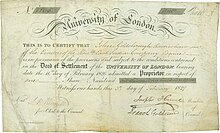
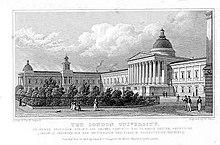
UCL was founded on 11 February 1826 as an alternative to theAnglicanuniversities ofOxfordandCambridge.[20]It took the form of ajoint stock company,with shares sold for £100 (equivalent to £10,600 in 2023) to proprietors, under the name ofLondon University,although without legal recognition as a university or the associated right to award degrees.[21][22][23]London University's first warden wasLeonard Horner,who was the first scientist to head a British university.[24]
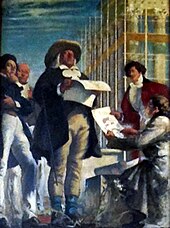
Despite the commonly held belief that the philosopherJeremy Benthamwas the founder of UCL, his direct involvement was limited to the purchase of share No. 633, at a cost of £100 paid in nine instalments between December 1826 and January 1830. In 1828, he did nominate a friend to sit on the council, and in 1827, attempted to have his discipleJohn Bowringappointed as the first professor of English or History, but on both occasions his candidates were unsuccessful.[25]However, Bentham is commonly regarded as the "spiritual father" of UCL, as his ideas on education and society were influential with the institution's founders, particularlyJames Mill(1773–1836) andHenry Brougham(1778–1868).[26]
In 1828, the chair of political economy at London University was created, withJohn Ramsay McCullochas the first incumbent.[27]In 1829, the university appointed the first professor of English in England, although the course concentrated on linguistics and the modern teaching of English – studying English literature – was introduced by King's College London in 1831.[28]In 1830, London University founded the London University School, which would later becomeUniversity College School.[29]In 1833, the university appointedAlexander Maconochie,secretary to theRoyal Geographical Society,as the first professor of geography in Britain.[30][31]Classes in medicine began at the opening of the college in 1828, and in 1834University College Hospital(originally North London Hospital) opened as a teaching hospital for these classes, which were organised into a faculty of medicine in 1836.[32]
1836 to 1900 – University College, London[edit]
After almost a decade of attempting to win recognition as a university and the right to award degrees, including an Address to the Crown from the House of Commons, the proprietors of London University accepted the government's proposal to establish the University of London as an independent examining body, accepting the status of a college for their institution.[33]As a result, the proprietors of London University were incorporated byroyal charterunder the nameUniversity College, Londonon 28 November 1836. On the same day, theUniversity of Londonwas created by royal charter as a degree-awarding examining board for students from affiliated schools and colleges, with University College andKing's College,London being named in the charter as the first two affiliates.[33][34]The first students from UCL and King's matriculated as undergraduates in 1838 and the first degrees were awarded to students of the two colleges in 1839.[35]
There had been an intention to establish a course in engineering at the college's opening but no professor was appointed until 1840 or 1841, after engineering courses had started at Durham University (1837) and King's College London (1838).[36][37]TheSlade School of Fine Artwas founded as part of University College in 1871, following a bequest fromFelix Slade.[38]
In 1878, the University of London gained a supplemental charter making it the first British university to be allowed to award degrees to women. The same year, UCL admitted women to the faculties of Arts and Law and of Science, although women remained barred from the faculties of Engineering and of Medicine (with the exception of courses on public health and hygiene).[39][40]UCL's admission of women in 1878 came almost three decades afterBedford Collegebecame the first institution to offer university-level education for women in Britain, and the establishment of the University of London's General Examination for Women in 1868.[41][42]
The Ladies' Educational Association held classes for women from 1868, taught by professors from UCL but independently of the college. From 1871 to 1872 these were held inside the college building, although still independently of the college. From 1872, some professors, particularlyEdward Poynterof the Slade, started to admit women to their classes.[43]The full opening on the faculties of arts, science and law in 1878 came two years after the admission of women alongside men at theUniversity of Bristolfrom its foundation (asUniversity College Bristol) in 1876.[44]The first woman to officially enrol in architecture at UCL wasGertrude Leverkusin 1915,[45]althoughEthelandBessie Charleshad been allowed to audit classes in the 1890s.[46]Women were finally admitted to medical studies during the First World War in 1917, although limitations were placed on their numbers after the war ended.[47]
A new royal charter granted to the University of London in 1858 effectively removed the affiliation of colleges to the university. Dissatisfaction from the colleges and the desire for a "teaching university" in London led to royal commissions that reported in 1888 and 1892 and the reconstitution of the university under the University of London Act 1898.[33]
1900 to 1976 – University of London, University College[edit]
| University College London (Transfer) Act 1905 | |
|---|---|
| Act of Parliament | |
 | |
| Citation | 5 Edw. 7.c. xci |
| Dates | |
| Royal assent | 11 July 1905 |
| Text of statute as originally enacted | |
Following the University of London's reconstitution in 1909, transforming it from an examining board to a federal university with constituent "schools", UCL, became a school of the University of London. While most of the colleges that became schools of the university retained their autonomy, UCL chose to be merged into the university in 1907 under the University College London (Transfer) Act 1905 (5 Edw. 7.c. xci) and surrendered its legal independence in return for gaining a greater say in the running of the university.[33]Its formal name becameUniversity of London, University College,although for most informal and external purposes the name "University College, London" (or the initialism UCL) was still used. As of 2022,[update]it remains listed as "University of London: University College" onUS Federal Student Aidapplications.[48]

1900 also saw the decision to appoint a salaried head of the college. The first incumbent wasCarey Foster,who served asPrincipal(as the post was originally titled) from 1900 to 1904. He was succeeded byGregory Foster(no relation), and in 1906 the title was changed toProvostto avoid confusion with the principal of the University of London. Gregory Foster remained in post until 1929.[49][50][51]In 1906, the Cruciform Building was opened as the new home forUniversity College Hospital.[52]UCL opened thefirst department and chair of chemical engineeringin the UK, funded by theRamsayMemorial Fund, in 1923.[53]
In 1904,Francis Galtondonated £1,000 to the University of London for aeugenicslaboratory; this transferred to UCL in 1907 withKarl Pearsonas its director.[54]UCL apologised for its "fundamental role in the development, propagation and legitimisation of eugenics" in 2021.[55]
In 1911, UCL received an anonymous donation of £30,000 (equivalent to £3,860,000 in 2023) for a building for itsschool of architecture.In 1919 the donor consented to being named asHerbert Bartlettand the school was renamed in his honour.[56]
UCL sustained considerable bomb damage during the Second World War, including the complete destruction of the Great Hall, the Carey Foster Physics Laboratory and the Ramsay Laboratory. Fires gutted the library and destroyed much of the main building, including the dome; it was not until 1954 that the main building was fully restored. The departments were dispersed across the country toAberystwyth,Bangor, Gwynedd,Cambridge,Oxford,RothamstednearHarpenden, HertfordshireandSheffield,with the administration at Stanstead Bury nearWare, Hertfordshire.[57]The first UCL student newspaper,Pi,was founded in 1946.[58]TheInstitute of Jewish Studiesrelocated from Manchester to UCL in 1959.[59]TheMullard Space Science Laboratorywas established in 1967.[60]
In 1973,Peter Kirstein'sresearch group at UCL became one of only two international nodes on theARPANET,later becoming part ofSATNET.[61][62]UCL'sinterconnectionbetween the ARPANET and earlyBritish academic networkswas the first international heterogeneousresource sharingnetwork.[63]UCL played a significant role in the veryearliest experimental Internet workand adoptedTCP/IPin 1982, ahead of the ARPANET.[64][65][66][note 1]
The college'ssenior common room,the Housman Room, remained men-only until 1969. After two unsuccessful attempts, a motion was passed that ended segregation by sex at UCL. This was achieved byBrian Woledge(Fielden Professor of French at UCL from 1939 to 1971) andDavid Colquhoun,at that time a young lecturer in pharmacology.[67]
1976 to 2005 – University College London[edit]
In 1976, a new charter restored UCL's legal independence, although still without the power to award its own degrees.[68][69]Under this charter the college became formally known asUniversity College London.This name abandoned the comma used in its earlier name ofUniversity College, London.
In 1993, a reorganisation of the University of London meant that UCL and other colleges gained direct access to government funding and the right to confer University of London degrees themselves. This led to UCL being regarded as ade factouniversity in its own right.[70][71]
Mergers were a major feature of this period of UCL's history. In 1986, the college merged with theInstitute of Archaeology.[72]In 1988, UCL merged with the Institute of Laryngology & Otology, the Institute of Orthopaedics, the Institute of Urology & Nephrology andMiddlesex Hospital Medical School.[72]Middlesex and University College hospitals, together with the Elizabeth Garrett Anderson Hospital and the Hospital for Tropical Diseases, formed theUniversity College London Hospitals NHS Trustin 1994.[73]
Mergers continued in the 1990s, with theInstitute of Child Healthjoining in 1995, the School of Podiatry in 1996[74]and theInstitute of Neurologyin 1997.[72][75]In 1998, UCL merged with the Royal Free Hospital Medical School to create the Royal Free and University College Medical School (renamed theUCL Medical Schoolin October 2008). In 1999, UCL merged with theSchool of Slavonic and East European Studies[76][77]and theEastman Dental Institute.[72]
Proposals for a merger between UCL andImperial College Londonwere announced in 2002.[78]The proposal provoked strong opposition from UCL teaching staff and students and theAUT union,which criticised "the indecent haste and lack of consultation", leading to its abandonment by UCL provost SirDerek Roberts.[79][80]
From 2005[edit]

UCL was granted its own taught and research degree awarding powers in 2005,[81]and all UCL students registered from 2007/08 qualified with UCL degrees.[82]The same year, UCL adopted a new corporate branding under which the name University College London was replaced by theinitialismUCL in all external communications.[83]
UCL established the UCL School of Energy & Resources (laterUCL Australia) inAdelaide,Australia, in 2008 as the first campus of a British university in the country.[84]The school was based in the historicTorrens Buildingin Victoria Square.[85]In 2011, the mining companyBHP Billitonagreed to donate AU$10 million to UCL to fund the establishment of two energy institutes – the Energy Policy Institute, based in Adelaide, and the Institute for Sustainable Resources, based in London.[86]UCL Australia closed in December 2017, with academic staff and student transferring to theUniversity of South Australia.[87]Since 2018, UCL and the University of South Australia have offered joint master's degrees in data science and in energy systems with study in Adelaide and London.[88]
In 2011, UCL announced plans for a £500 million investment in its main Bloomsbury campus over 10 years, as well as the establishment of a new campus,UCL East,next to the Olympic Park in Stratford in the East End of London.[89]In 2018, UCL openedUCL at Here East,at the Queen Elizabeth Olympic Park, offering courses jointly between theBartlett Faculty of the Built Environmentand theFaculty of Engineering Sciences.[90][91]The first undergraduate students, on a new Engineering and Architectural DesignMEng,started in September 2018.[92]One Pool Street, the first building on the UCL East campus, opened in November 2022. UCL East was officially opened, along with the Marshgate building that completed phase 1 of the development, in September 2023 by Olympic gold medalist and UCL alumnaChristine Ohuruogu.[93][94]
UCL continued to grow through mergers with smaller colleges in the University of London. On 1 January 2012 theSchool of Pharmacy, University of Londonmerged with UCL, becoming the UCL School of Pharmacy within the Faculty of Life Sciences.[95][96]UCL and theInstitute of Educationformed a strategic alliance in October 2012,[97]followed by a full merger in December 2014.[98][99][100][101]

UCL paid tens of thousands of pounds to settle ten sexual harassment claims against staff in the 2017/18 academic year, a rise from four cases the year before. Following pressure from victims, and after physicistEmma Chapmanwon the legal right to speak freely about her abuse at the university, UCL announced in 2018 that it would abandon non-disclosure settlements in settlements.[102][103]In 2020, UCL became the firstRussell Groupuniversity to ban romantic and sexual relationships between lecturers and their students.[104]
It was discovered in 2018 that an annual eugenics conference, theLondon Conference on Intelligence,had been held at UCL, as an external paid event, between 2014 and 2017.[105]An enquiry found that the organiser, an honorary lecturer, did not correctly follow the room booking procedure, including claiming that no controversial topics would be discussed, leaving the university unaware of the nature of the conference.[106]Following the revelation, UCL announced in 2018 that it would launch an enquiry into the university's historical links with eugenics.[107]This reported in 2020,[108]but covered only historical eugenics and did not address the 2014–17 conferences, leading to a majority of the authors refusing to sign the final report.[109]The Galton Lecture Theatre, Pearson Lecture Theatre and Pearson Building were all renamed in 2020,[109]and in 2021 UCL apologised for its part in promotingeugenicsduring the first half of the 20th century.[55][110]UCL was criticised (along with Oxford, Imperial and other London universities) in 2021 for accepting money from the Alexander Mosley Charitable Trust, established to hold the fortune left toMax Mosleyby his father, British fascist leaderOswald Mosley.UCL received £500,000 to establish a forensic evidence interpretation laboratory.[111][112][113]
Following the passing of the University of London Act 2018, which allowed member institutions to become universities in their own right while remaining part of the University of London, UCL applied for university status in 2019.[114]The application was approved by theOffice for Studentsin 2022 and a supplemental charter was sealed on 17 April 2023, granting UCL university status.[115]
Campus and locations[edit]
Bloomsbury[edit]
UCL is primarily based in theBloomsburyarea of theLondon Borough of Camden,inCentral London.The main campus is located aroundGower Street,with many other departments close by in Bloomsbury.[116]Many health institutes are located close to associated hospitals, including theUCL Queen Square Institute of Neurologyand theNational Hospital for Neurology and NeurosurgeryinQueen Square,[117]theUCL Great Ormond Street Institute of Child HealthandGreat Ormond Street Hospital for Children,[116]and theUCL Eastman Dental InstituteandEastman Dental Hospital.[118]
Historic UCL buildings in Bloomsbury include the grade I listedUCL Main Building,including the original Wilkins building designed byWilliam Wilkins,[119]and, directly opposite on Gower Street, the early 20th century grade II listed Cruciform Building, the last major building designed byAlfred Waterhouse.[120][121]Nearby are the grade II listed Kathleen Lonsdale Building, UCL's first purpose-built chemistry laboratory,[122]and the grade II listed Rockefeller Building.[123]Elsewhere in Bloomsbury is the 1970s grade II*Institute of Education buildingbyDenys Lasdunand Partners.[124]Much of the estate falls within the BloomsburyConservation Area,designated in 1968.[125]Important contemporary buildings include theSchool of Slavonic and East European Studies building(RIBA Awardwinner 2006)[126]and theSainsbury Wellcome Centre for Neural Circuits and Behaviour building(LEAF Awardfor best façade design and engineering and overall winner 2016).[127]

UCL East[edit]
UCL has a second campus,UCL East,at theQueen Elizabeth Olympic Parkin Stratford, east London. The first building, with three floors of teaching and research space as well as accommodation for 500 students in two towers, opened in 2022, and the second, with eight floors of teaching and research space, opened in 2023.[93][128]A further four buildings are planned for construction in the 2030s.[129]UCL also operates a campus withinHere East,the former Olympic park media centre.[90]
Other sites[edit]

Elsewhere in Central London are theUCL Institute of Ophthalmologyadjacent toMoorfields Eye HospitalinClerkenwell,[130]theRoyal Free Hospitaland theWhittington Hospitalcampuses of the UCL Medical School, and a number of other associated teaching hospitals. TheUCL School of Managementis on levels 38 and 50 (penthouse) ofOne Canada Squarein the financial district ofCanary Wharf.[131]TheUCL Observatoryis inMill Hill[132]and theMullard Space Science Laboratoryis based inHolmbury St Mary,Surrey.[133]The UCL Athletics Ground is in Shenley, Hertfordshire.[134]
Student housing[edit]
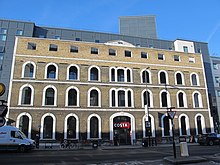
UCL owns 26 halls of residence with around 7,000 student beds.[135]The university guarantees accommodation to single full-time first-year undergraduate students who have not previously lived in London while studying at a university, and who make a firm acceptance of a place and apply for accommodation by 10 June each year, and to single overseas first-year postgraduates at UCL who have not previously lived in London while studying at a university, and who make a firm acceptance of a place and apply for accommodation by 30 June each year. Accommodation is also guaranteed for students who are under 18 at the start of the academic year and for students who are care-leavers.[136]There is only limited accommodation available in university halls for returning students and others who do not meet the criteria for a guaranteed place.[137]UCL students are also eligible, as students of a member institution of the University of London, to apply for places in theUniversity of London intercollegiate halls of residence.[138]
In 2013, UCL's newly built New Hall student accommodation building onCaledonian Road,designed by Stephen George and Partners, was awarded theCarbuncle Cupand named the country's worst new building byBuilding Designmagazine, with the comment "this is a building that the jury struggled to see as remotely fit for human occupation". Islington Council had originally turned down planning permission for the building, but this had been overturned on appeal. As it is classified as a hotel or guest house, it was exempt from many of the standards that cover residential buildings, such as having daylight in the rooms.[139][140]
The UCL East development includes 532 student rooms in One Pool Street, which opened in 2022.[141]Further accommodation will be available in the Marshgate building, expected to open in 2023, and at the second Pool Street site.[142]
Environmental initiatives[edit]
UCL's new Student Centre, which opened in 2019, was designed to be environmentally friendly and was one of only 320 buildings worldwide (at the time) to be certifiedoutstandingbyBREEAM.[143]This certification requires innovation throughout the design, engineering and construction process, and places the Student Centre among the top 1% of non-domestic buildings in the UK for sustainability.[144]The UCL Student Centre was a finalist at theGreen Gown Awardsin 2019.[145]
Also in 2019, UCL launched aStrategy for Sustainable UCL 2019–24,including three initiatives to promote sustainability. ThePositive Climateinitiative saw UCL pledge to have a 40% reduction in energy usage, all energy to come from renewables, and all UCL buildings to becarbon neutralby 2024, along with achievingnet zerocarbon emissions for UCL by 2030.[143]ThePositive Climateinitiative was the winner in the "2030 Climate Action" category at the 2020 Green Gown Awards.[146][147]
A second initiative,The Loop,promotescircular economy.UCL set a target of reducing waste per person by 20% between 2019 and 2024, while aiming for an 85% recycling rate and the elimination of single-use plastics on campus. The third initiative,Wild Bloomsbury,promotesbiodiversity.UCL set a target of creating 10,000 m2(1.0 ha; 2.5 acres) of biodiverse green space on campus by 2024.[143]TheStrategy for a Sustainable UCLwas a finalist in the "Sustainable Institution of the Year" category at the 2022 Green Gown Awards.[148]
Organisation and administration[edit]
Governance[edit]
The two main bodies in UCL's governance structure are thecounciland theacademic board,both of which are established by the royal charter and with powers defined by the statutes.[149]There is also a University Management Committee, which is the executive committee responsible for the day-to-day operations of the institution. This comprises the President and Provost, the vice-presidents, the vice-provosts, the pro-provost of UCL East, the deans of the faculties, the chief financial officer, chief information officer, and chief people officer, the chief of staff, the general consul, the executive director of media and marketing, and the director of media relations.[150]
The senior leadership team at UCL includes thevisitor,a position in English charity law that overseas the operation of the institution.[151]That there shall be a visitor of the college is specified by the royal charter, as is that the position is to be held by theMaster of the Rolls,the second most senior judge in England and Wales.[149]
UCL's council comprises 20 members, of whom 11 are members external to UCL; seven are UCL academic staff, including the provost, three UCL professors and three non-professorial staff; and two are UCL students. The chair is appointed by council for a term not normally exceeding five years. The chair isex officiochair of the honorary degrees and fellowships committee, nominations committee and remuneration and strategy committee.[152]As of April 2023,[update]the chair of the council is international businessman and UCL alumnus Victor Chu.[3]
The academic board plays a role similar to thesenatein other institutions. It is the senior academic body responsible for advising council on academic matters and also elects academic members to council. It is, however, a much larger body than the senates at many other universities, including all professors as well as elected representatives of other academic and non-academic staff.[149][153]
UCL's principal academic and administrative officer is the President and Provost, who is also UCL's designatedaccountable officerfor reporting to theOffice for Studentson behalf of UCL.[154]The provost is appointed by Council after consultation with the academic board, and isex officioa member of council and chair of the academic board.[155]As of April 2023,[update]Michael Spencehas been president and provost since January 2021, when he succeededMichael Arthur.[156][157]
Vice-provosts are appointed by council on the recommendation of the provost or the academic board, to assist and advise the provost as required. The vice-provosts are members of the provost's senior management team. There are four vice-provosts (for education and student experience; health; research, innovation and global engagement; and faculties).[149][158]There are also four vice-presidents, who are also members of the senior management team but whose role and manner of appointment is not specified in the statutes, for strategy, external engagement, advancement and operations.[149][158]
The deans of UCL's faculties are appointed by the council and are members of the provost's senior management team. The deans' principal duties include advising the provost and vice-provosts on academic strategy, staffing matters and resources for academic departments within their faculty; overseeing curricula and programme management at faculty level; liaising with faculty tutors on undergraduate admissions and student academic matters; overseeing examination matters at faculty level; and co-ordinating faculty views on matters relating to education and information support.[152]
Faculties and departments[edit]


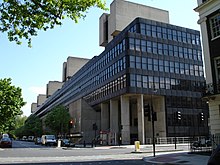
UCL's research and teaching is organised into eleven faculties, each of which contains a number of schools, departments and institutes.[159]The establishment of faculties and academic departments is formally the responsibility of UCL's council, with advice from the academic board.[160]
| Faculty[159] | Staff | Students | ||
|---|---|---|---|---|
| Undergraduates | Postgraduates | |||
| Taught | Research | |||
| Arts and Humanities | 620 | 2,684 | 943 | 226 |
| Bartlett (Built Environment) | 1,272 | 925 | 2,836 | 411 |
| Brain Sciences | 1,725 | 929 | 1,961 | 1,034 |
| Engineering Sciences | 667 | 4,373 | 2,791 | 1,122 |
| IOE(Education and Society) | 1,318 | 1,515 | 3,988 | 684 |
| Laws | 175 | 844 | 450 | 49 |
| Life Sciences | 964 | 2,632 | 1,084 | 592 |
| Mathematical and Physical Sciences | 1,135 | 3,927 | 929 | 680 |
| Medical Sciences | 1,321 | 2,356 | 1,287 | 430 |
| Population Health Sciences | 1,578 | 247 | 1,365 | 447 |
| Social and Historical Sciences | 1,101 | 4,130 | 2,054 | 488 |
There are also two academic units outside the faculty structure:[160]
- Sainsbury Wellcome Centre for Neural Circuits and Behaviour
- School of Slavonic and East European Studies(to join the Arts and Humanities faculty from 2023):[162]193 staff; 559 undergraduate students; 57 taught postgraduate students; 29 research postgraduate students (2022/23)[161]
There are additional staff employed outside the faculty structure in the university administration.[161]
Finances[edit]
In the financial year ended 31 July 2020, UCL had a total income (excluding share of joint ventures) of £1.54 billion (2018/19 – £1.49 billion) and a total expenditure of £1.34 billion (2018/19 – £1.67 billion).[2]Key sources of income included £467.7 million from research grants and contracts (2018/19 – £481.1 million), £613.7 million from tuition fees and education contracts (2018/19 – £564.9 million), £227.9 million from funding body grants (2018/19 – £213.5 million) and £26.6 million from donations and endowments (2018/19 – £40.5 million).[2]At year end UCL had endowments of £143.2 million (31 July 2019 – £138.7 million) and total net assets of £1.49 billion (31 July 2019 – £1.29 million).[2]
A report by London Economics in 2022 found that UCL generates around £10 billion annually for the UK economy. The largest contributor to this is through the spread of its research and knowledge, which is worth £4 billion, with another £3 billion being added by the impact of UCL's own spending. Other contributions come from encouraging graduates to create jobs and investment, and from nurturing company spin-offs and start-ups. The report found that in 2018–19, UCL had supported 234 graduate start-ups and 83 spinout companies, with a total turnover of £110 million and employing almost 3,000 people. The report also found that UCL's spending supported 19,000 jobs across the UK, with over 7,000 of these being outside London.[15]
Terms[edit]
The UCL academic year is divided into three terms. For most departments, First Term runs from late September to mid December, Second Term from mid January to late March, and Third Term from late April to mid June, with reading weeks in early November and mid February. Certain courses at the medical school, the faculty of education and society, and the school of pharmacy operate on different terms.[163]
Logo and colours[edit]
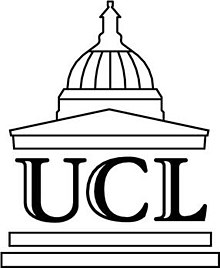
While many universities use their logo for most communications and branding and a coat of arms only for specific ceremonial and official use,[164]UCL exclusively uses a logo and has no coat of arms. The present logo was adopted as part of a rebranding exercise in August 2005.[83]Prior to that date, a different logo was used, in which the letters UCL were incorporated into a stylised representation of the Wilkins Buildingportico.[165]
A pseudo-heraldic "UCL crest" – a purple shield depicting a raised bent arm dressed in armour between two gold laurel branches holding a green upturned open wreath, with the college motto on a blue celeste ribbon beneath the laurel branches – can be found on the internet. A version of this badge (not on a shield) appears to have been used byUCL Unionfrom shortly after its foundation in 1893.[166]However, the badge has never been the subject of an officialgrant of arms,and departs from several of the rules and conventions ofheraldry.It is not an official logo, although modified forms are used by some by sports teams and societies.[167]The official Team UCL logo, used (with variants) by many sports teams, uses a shield divided into the colours of purple (lower) and blue celeste (upper), but none of the other elements (laurels, wreaths, armoured arm, motto) are present; the only graphic is a depiction of the UCL portico. Students' Union UCL requests teams not to modify this logo, but this is widely ignored.[168][169]
UCL's motto, "Cuncti adsint meritaeque expectent praemia palmae"is a quotation fromVirgil'sAeneid,and translates into English as "Let all come who by merit deserve the most reward".[170][171]
UCL's traditional sporting and academic colours are purple and blue celeste.[7]UCL uses a palette of 25 colours (including the two traditional colours) in its visual identity; the logo can be used in many different combinations of these colours.[7]
Memberships, affiliations and partnerships[edit]

UCL is a member institution of the federal University of London and was one of the two colleges affiliated from the university's founding in 1836 (the other beingKing's College London).[172]UCL was a founding member of theRussell Group,an association of 24 British research universities established in 1994,[173]and is regarded as forming part of the 'golden triangle', an unofficial term for the research-intensive universities located in the southern English cities of Cambridge, London and Oxford[174][175][176]
UCL has been a member of theLeague of European Research Universitiessince January 2006.[177][178]UCL is also a member of theAssociation of Commonwealth Universities,[179]theEuropean University Association,[180]the global U7+ Alliance[181]and the USUniversities Research Association,[182]and has a major collaboration withYale University,the Yale UCL Collaborative.[183]It also has partnerships with universities in Australia,[note 2]Canada,[note 3]China,[note 4]India,[note 5]Japan,[note 6]Singapore[note 7]and Thailand.[note 8][184][185][186][187]
UCL formed theScience and Engineering Southengineering and physical sciences research alliance with the universities of Cambridge, Oxford, Southampton and Imperial College London in May 2013.[188]It was also one of the founding members of theAlan Turing Institute,the UK's national institute for data sciences and artificial intelligence, in 2015, with the universities of Cambridge, Edinburgh, Oxford and Warwick.[189]

UCL is a partner inUCLPartners,anacademic health science centre,along with multiple NHS trusts, integrated care systems, research and innovation partners, and other universities.[190]UCL is a partner with theNational Institute for Health Research,theUniversity College London Hospitals NHS Foundation Trustand UCLPartners in theUCLH Biomedical Research Centre.[191]UCL is also a university partner of theFrancis Crick Institute,a major biomedical research centre in London.[192]
UCL offers dual degrees and joint degrees with other universities and institutions, including theUniversity of Cologne,[193]Columbia University,[194]theUniversity of Hong Kong,[195]Imperial College London (ending 2023)[196]andNew York University.[197]
UCL is the sponsor of theUCL Academy,asecondary schoolin theLondon Borough of Camden.The school opened in September 2012 and was the first in the UK to have a university as sole sponsor.[198]UCL also has a strategic partnership withNewham Collegiate Sixth Form Centre.[199]
Academic profile[edit]
Research[edit]

In 2021/22, UCL had an income from research grants and contracts of £524.9 million, making up 30% of all revenue. The largest sources of research income were research council grants (£170.4 million) and British charities (£154.4 million). A further £159.3 million of recurrent research funding was allocated to UCL byResearch England,making up 9% of income.[2]
UCL submitted 3,432 staff (3,177 FTEs) across 32 units of assessment (areas of research) to the 2021Research Excellence Framework(REF) assessment. 58% of submitted research was rated 4* ('world leading'), the sixth highest in the REF, and a further 34% as 3* ('internationally excellent'). Overall, UCL was ranked second for both research power and market share by bothTimes Higher EducationandResearch Professional News,and sixth on research quality (GPA) byTimes Higher Education.UCL submitted more units of assessment to the 2021 REF than any other university. However, UCL's market share (based on the funding formula) declined from 6.23% following the 2014 REF to 5.34%, despite the overall improvement, reflecting increases in research quality across the sector.[200][201][202][203]
Research centres[edit]
UCL operates a large number of disciplinary-specific research centres in partnership with other research institutions and private enterprises. Notable examples include:
- TheLondon Centre for Nanotechnology(LCN) is a multidisciplinary research centre in physical and biomedical nanotechnology based at UCL's campus in Bloomsbury. It is a partnership between UCL,Imperial College LondonandKing's College London.[204]The LCN was established as a joint venture between UCL and Imperial College London in 2003;[205]King's College London joined the LCN in 2018.[206]
- TheCentre for the Study of the Legacies of British Slave-ownershipwas established at UCL with the support of theHutchins Center for African and African American ResearchatHarvard University.It incorporates two earlier projects: theLegacies of British Slave-ownership project(2009–2012) and theStructure and significance of British Caribbean slave-ownership1763–1833 project (2013–2015).[207]
- TheSainsbury Wellcome Centre for Neural Circuits and Behaviour(SWC) is a neuroscience research centre established at UCL with funding from theGatsby Charitable FoundationandWellcome Trustand opened in 2016.[208][209]
Publishing and commercialisation[edit]
In 2020/21, UCL had an income of £7.3 million from intellectual property and £25.2 million from the sale of shares in spin-off companies. As of 2020/21, UCL had the second largest patent portfolio of any UK university (after Oxford) with 2,391 patents. It granted the third largest number of intellectual property licences (after Oxford and the University of East Anglia), with 2,235.[210]
UCL Businessis atechnology transfercompany which is wholly owned by UCL. It has three main activities: licensing technologies, creating spin-out companies, and project management.[211]UCL Business supports spin-out companies in areas including discovery disclosure, commercialisation, business plan development, contractual advice, incubation support, recruitment of management teams and identification of investors.[211]In the area of licensing technoloiges, the company provides commercial, legal and administrative advice to help companies broker licensing agreements.[211]UCL Business also provides UCL departments and institutes with project management services for single or multi-party collaborative industry projects.[211]The company transferred £4.8 million of royalty income to UCL in 2021/22.[2]
Launched in 2015, UCL Press is anew university press[212]wholly owned by UCL.[213]It was the first fullyopen accessuniversity press in the UK, and publishes monographs, textbooks and other academic books in a wide range of academic areas which are available to download for free, in addition to a number of journals.[214]As of October 2022, UCL Press had had more than 6.5 million downloads of its open access books in 247 countries and territories worldwide.[215]UCL Consultants is an academic consultancy services company which is wholly owned by UCL, which provides four main service offerings: Academic Consultancy, Bespoke Short Courses, Testing & Analysis and Expert Witness.[216][217]
Libraries[edit]

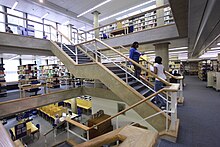
The UCL library system comprises 18 libraries located across the Bloomsbury and UCL East campuses.[218]The libraries contain a total of over 2 million books.[219]The largest library is the UCL Main Library, which is located in the UCL Main Building and contains collections relating to the arts and humanities, economics, history, law and public policy.[218]The second largest library is the UCL Science Library, which is located in the DMS Watson Building on Malet Place and contains collections relating to anthropology, engineering, geography, life sciences, management and the mathematical and physical sciences.[218]The Cruciform Hub contains books and periodicals in the subjects of clinical medicine and medical science.[220]It holds the combined collections of the former Boldero and Clinical Sciences libraries which developed within theMiddlesex Hospital,University College HospitalandRoyal Free&University College Medical Schoolsup until their merger in 2005.[221]
Other libraries include theUCL BartlettLibrary (architecture and town planning), theUCL Eastman Dental Institute Library(oral health sciences), theUCL Institute of ArchaeologyLibrary (archaeology and egyptology), the UCL Institute of Education'sNewsam Library(education and related areas of social science), theUCL Institute of Neurology Rockefeller Medical Library(neurosurgery and neuroscience), theJoint Moorfields Eye Hospital & the UCL Institute of Ophthalmology Library(biomedicine, medicine, nursing, ophthalmology and visual science), the UCL Language & Speech Science Library (audiology, communication disorders, linguistics & phonetics, special education, speech & language therapy and voice) and theUCL School of Slavonic and East European Studies Library(the economics, geography, history, languages, literature and politics of Eastern Europe).[218]The newest library is the UCL East Library, currently located in the Learning Hub on the first floor of One Pool Street. Uniquely among UCL libraries, it offers a 'click and collect' service allowing books from any UCL library to be delivered to UCL East rather than having to be picked up from the library that holds them. It is expected to relocate to the new Marshgate building when that opens in September 2023.[222]
UCL staff and students have full access to the main libraries of the University of London – theSenate House Libraryand the libraries of the institutes of theSchool of Advanced Study– which are located close to the main UCL campus in Bloomsbury.[223]These libraries contain over 3.7 million books and focus on the arts, humanities and social sciences.[219]TheBritish Library,which contains around 14 million books, is also located close to the main UCL campus and all UCL students and staff can apply for reference access.[224]
UCL'sopen accessinstitutional repository,UCL Discovery, andUCL Press,UCL's open accessacademic pressare managed by UCL Library Services.[225]
Special collections[edit]
UCL's Special Collections contains UCL's collection of historical or culturally significant works. It holds over 150,000 rare books, including 179incunabula,as well as over 600 collections of archives and manuscripts. The incunabula include a 1477 edition of Dante'sDivine Comedy,and a 1493 edition of theNuremberg Chronicledonated by Jeremy Bentham.[226][227]
UCL's most significant works are housed in three strong rooms. The special collection includes first editions ofIsaac Newton'sPrincipia,Charles Darwin'sOn the Origin of SpeciesandJames Joyce'sUlysses.[228]
Museums[edit]

UCL is responsible for several museums and collections in a wide range of fields across the arts and sciences, including:[229]
- Petrie Museum of Egyptian Archaeology:Founded in 1892 by a donation fromAmelia Edwardsof several hundred Egyptian items, the museum now contains around 80,000 items and covers the history of the Nile valley from prehistoric times through to the Islamic period. It is named afterWilliam Flinders Petrie,the first Edwards Professor at UCL, who excavated dozens of sites in his career and sold his collection to the college in 1913.[230]The Petrie Museum is adesignated collectionunder theArts Council EnglandDesignation Scheme for "pre-eminent collections held in museums, libraries and archives across England".[231]
- UCL Art Museum: the art collection originated as a teaching and research collection for the Slade, and contains works by women artists dating back to the 1890s. A series of plaster casts of full-size details of sculptures byJohn Flaxmanis located inside the library under the dome of the UCL Main Building.[232]
- Grant Museum of Zoology and Comparative Anatomy:Established in 1827 byRobert Edmund Grant,UCL's first professor of comparative anatomy and zoology, for teaching purposes. Grant bequeathed his collection of 10,000 specimens to UCL upon his death. With other additions, the museum now contains around 68,000 specimens, includingdodobones and a rarequaggaskeleton.[233]
Reputation and rankings[edit]
| National rankings | |
|---|---|
| Complete(2025)[234] | 9 |
| Guardian(2024)[235] | 8 |
| Times / Sunday Times(2024)[236] | 6 |
| Global rankings | |
| ARWU(2023)[237] | 17 |
| QS(2025)[238] | 9 |
| THE(2024)[239] | 22 |
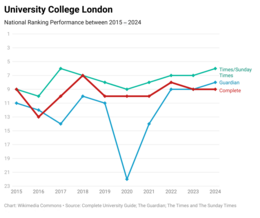
- National
UCL is ranked as one of the top ten universities in all three of the mainUK university league tables.[234][235][236]These place more emphasis on teaching and student experience than global rankings, using criteria such as teaching quality and learning resources, entry standards, employment prospects, research quality and dropout rates.[240]It went through a dip in rankings in recent years, particularly inThe Guardian University Guide,but returned to the top ten in 2022, when its ninth position was its best result in that table since 2014.[241]
In the 2023Complete University Guidesubject tables, UCL was ranked in the top ten in 34 subjects out of 42 offered (81%). It was ranked top for American studies, linguistics, speech and language therapy, and building.[242]
In the 2023Guardian University Guidesubject tables, UCL is ranked top in construction, surveying and planning. It was ranked in the top ten for 21 of 31 subjects offered (68%).[235]
UCL is ranked top in the 2023Times/Sunday Times Good University Guidefor American studies, building, information systems and management, liberal arts, and town and country planning. It is ranked in the top ten for 31 of 44 subjects offered (70%). The 2023Good University Guidealso ranked UCL 98th in their social inclusion ranking (covering England and Wales). UCL was namedUniversity of the Yearin theTimes/Sunday Times Good University Guidefor 2024.[236]
Analysis by theDepartment for Educationin 2018, found that UCL had an impact on earnings of graduates five years after graduation of +15.5% for women (7th highest impact) and +16.2% for men (10th highest impact) compared to average graduates with similar background characteristics (prior attainment, socio-economic status, etc.) and subject choice.[243]
- Global
UCL has been consistently ranked in the top 25 of the three major global rankings published over 2013 to 2022, including being in the top ten of theQS World University Rankingsover the whole of that period.[244][245][246]
In the 2022Academic Ranking of World Universities,UCL was ranked 18th in the world,[237]having been placed between 15th and 21st in the rankings from 2013 to 2022.[244]
In the 2023QS World University Rankings(published 2022), UCL was ranked 8th in the world.[238]It has ranked between 4th and 10th in the 2014 to 2024 league tables.[245]
In theTimes Higher EducationWorld University Rankings2023 (published 2022), UCL was ranked 22nd in the world,[239]having ranked between 14th and 22nd in the 2014 to 2023 tables.[246]In theTimes Higher EducationWorld Reputation Rankings 2022, UCL was ranked 25th, while in theTimes Higher EducationImpact Rankings 2022 it was ranked 101–200.[246]
In the 2024–2025USNWR's Best Global Universities,UCL was ranked joint 7th in the world[247].
Admissions[edit]
| Main scheme applications[248] | |
| Applications | 74,775 |
| Accepted applicants | 7,420 |
| Applications/accepted ratio | 10.08 |
| UK applicants, June deadline[249] | |
| Applications | 31,285 |
| Offer rate (%) | 29.5 |
| Offers | 9,700 |
| Placed applicants | 3,175 |
| Placed applicants/offers (%) | 32.7 |
| Summary statistics | |
| Total accepted applicants[248] | 7,530 |
| Average Entry Tariff(2020)[250] | 189 |
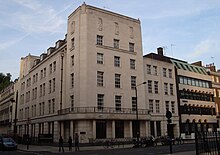
Admission to UCL is highly selective with an average entry tariff for 2020–21 of 189UCAS points(approximately equivalent to AAAB atA-level), the 9th highest in the country.[250]According to aFreedom of Informationrequest response, UCL's offer rate for 2021 admission was 36.1% at undergraduate level and 23.5% at postgraduate level across all applicants.[251][note 9]
International students have made up the majority of main-scheme applicants to UCL since 2015 and the majority of acceptances since 2017. The ratio of main-scheme applicants to acceptances in 2022 was 10.3 for UK applicants and 9.9 for international applicants.[248]Within the UK, UCL is a local recruiter,[252]with 47.4% of 2022 UK admissions coming from the London region and a further 28.1% from the adjacent East of England and South East regions.[248]
Of UCL's young UK domiciled undergraduates, 32.7% wereprivately educatedin 2019–20, the eighth highest proportion amongst mainstream British universities.[253]
Undergraduate law applicants are required to take theNational Admissions Test for Law[254]and undergraduate medical applicants are required to take theBioMedical Admissions Test.[254]Applicants for European Social and Political Studies are required to take theThinking Skills Assessment(TSA) should they be selected for an assessment day.[254]Medicine, pharmacy and English also interview undergraduate applicants prior to making an offer of admission.[254]
Widening access[edit]
| Independent school | 32.4% | |
| Benchmark | 25.5% | |
| Low participation areas | 4.3% | |
| Benchmark | 4.0% |
UCL runs a contextual offer scheme called Access UCL, whereby eligible applicants can receive conditional offers for courses at UCL that have lower requirements than the standard conditional offers for those courses. Eligibility for Access UCL can be through an applicant living in a deprived areas or an area with low participation in higher education, through having spent time in care, though being a young adult carer, or through being estranged from their family. Except for applicants that have spent time in care, the scheme requires applicants to have attended a state school. Mature applicants are assessed on the same criteria, and are additionally not eligible if they have completed or are on the final year of an undergraduate degree. While the scheme enables applicants from disadvantaged backgrounds to receive contextual offers, it does not guarantee that an offer will be made.[256]Contextual offers vary by course. For example, a contextual offer for the law LLB reduces the requirement from A*AA to BBB atA level,[257]but for the physics MSci from A*AA to AAB.[258]
UCL also runs week-long UCL Summer Schools for high-achieving students from disadvantaged backgrounds in partnership with theSutton Trust.These give participants the opportunity to explore London, to develop skills in their chosen subject, to improve their university applications through personal statement workshops and talks by admissions tutors, and to take part in social activities.[259]
From the 2023/24 academic year, UCL will be launching an engineeringfoundation yearbased at UCL East for students who do not meet the standard entry requirements, who attended UK state schools forA levelsor equivalent (unless refugees), and who live in an area with high levels of at least one axis of deprivation.[260]
For international students who do not meet the requirements for admission to the college, it runs intensive one-yearfoundation courses,called Undergraduate Preparatory Certificates, in either sciences or humanities.[261]
For UK domiciled young full-time undergraduate entrants in 2020/21, 67.6% came from state schools, significantly below the location-adjusted benchmark of 74.5%, and 4.3% came from low participation neighbourhoods, not significantly different from the location-adjusted benchmark of 4.0%.[255]For UK-domiciled undergraduate entrants in 2022/23, UCAS data shows no significant difference in offer rate with ethnicity or gender.[249]Applicants from the 20% of neighbourhoods with the lowest rates of participation in higher education receive offers at a rate 4.9% higher than would be expected based on their subject choice and predicted grades alone, a statistically significant difference, accounting for 6.3% of all offers. The offer rate for applicants from the 20% of neighbourhoods with the lowest rates of participation in higher education is not significantly different from that expected, with applicants from those neighbourhoods accounting for 48.9% of all offers.[249]
Student life[edit]
Students' union[edit]

Founded in 1893, Students' Union UCL, formerly the UCL Union, is one of the oldest students' unions in England, although postdating theLiverpool Guild of Studentswhich formed a student representative council in 1892.[68][262]Students' Union UCL operates both as the representative voice for UCL students, and as a provider of a wide range of services. It is democratically controlled through General Meetings and referendums, and is run by elected student officers. The union also supports a range of services, including numerous clubs and societies, sports facilities, an advice service, and a number of bars, cafes and shops.[263]
As of 2021,[update]there are over 250 clubs and societies under the umbrella of the UCL Union.[264]These include: UCL Snowsports (one of the largest sports society at UCL, responsible for organising the annual UCL ski trip),[265]Pi Media(responsible forPi MagazineandPi Newspaper,UCL's official student publications),[266]the Debating Society (established 1829),[267]and the UCL Union Film Society, with past members includingChristopher Nolan.[268]
Faith[edit]
From its foundation the college has been deliberately secular; the initial justification for this was that it would enable students of different Christian traditions (specificallyRoman Catholics,AnglicansandNonconformists) to study alongside each other without conflict.[269]In order to cater to people of all faiths, UCL opened a prayer room (with attached ablution facilities) and a silent meditation room in the student centre in February 2019, and there is a quiet contemplation room behind 16–26 Gordon Square. There is also a Christian chaplain (who also serves as interfaith advisor) and there are student societies for most major religions.[270][271]
Sport[edit]
The union runs over 70 sports clubs,[272]including the UCL Cricket Club (Men's and Women's),UCL Boat Club(Men's and Women's clubs), UCL Running, Athletics and Cross Country Club, and UCL Rugby Club (Men's and Women's), as well asRUMS sports clubsfor medical students (from Royal Free, University College and Middlesex, the three medical schools that merged into UCL).[169][273]
UCL clubs compete in inter-university fixtures in theBritish Universities and Colleges Sport(BUCS) competition in a range of sports, including athletics, basketball, cricket, fencing, football, hockey, netball, rugby union and tennis. In the 2021/22 season, UCL finished in 16th position in the final BUCS rankings.[274]
UCL sports facilities include a fitness centre at the main UCL campus in Bloomsbury and a 90-acre (36 ha) athletics ground inShenley,Hertfordshire,[275]part of which is used as theWatford Football Club Training Ground.[276]It also exercises effective control overSomers TownCommunity Sports Centre, with the power to appoint five of the nine trustees.[2]The sports centre includes a six-court sports hall,[277]as well as an activity/dance studio and an all-weather outdoor multi-use games area.[278][279][280]
Mascot[edit]

The UCL mascot was Phineas MacLino, or Phineas, a wooden tobacconist's sign of a kilted Jacobite Highlander stolen from outside a shop inTottenham Court Roadduring the celebrations of therelief of Ladysmith,part of theSecond Boer War,in March 1900.[281]In 1922, Phineas was stolen by students from King's, marking the start of 'mascotry', leading to an hour-long battle and the eventual return of Phineas.[282]In 1993, the students' union's centenary year, Phineas was placed in the third floor bar of 25 Gordon Street and the bar named after him.[283]In 2019, the students' union voted to remove the mascot from the bar due to its links to imperialism and British colonialism.[284][285]
Rivalry with King's College London[edit]
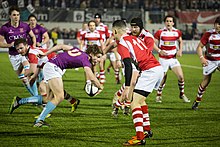
UCL has a long-running, mostly friendly rivalry withKing's College London,but there were frequent clashes in the interwar period which have historically been known as "rags".[286]UCL students have been referred to by students from King's as the "Godless Scum of Gower Street", in reference to a comment made at the founding of King's, which was based on Christian principles. UCL students in turn referred to King's as "Strand Polytechnic".[287][288]
In 1922 Phineas, the UCL mascot was kidnapped by King's students, leading to a pitched battle in the King's College quad as UCL students recovered their mascot.[289][290]Shortly after this, King's adopted their own mascot – initially a large papier-mâché beer bottle, soon replaced byReggie the Lion.[282]During the 1927 rag, Reggie was captured by UCL students and his body filled with rotten apples. During the same year, an attempt by King's students to capture Phineas led to the "Battle of Gower Street", caught on camera byBritish Pathé.[291]On another occasion, Reggie was castrated by UCL students.[292]
King's students stole the embalmed head ofJeremy Benthamin October 1975, only returning it after UCL paid a ransom to charity. The head is now kept in the UCL vaults.[293]
Student campaigns[edit]
In 1956, UCL students organised a silent march progressing against the Soviet oppression of theHungarian Revolution of 1956.Around 1,300 students from across institutions in London matches from the Royal Albert Hall to the Soviet Embassy. There were activeCampaign for Nuclear Disarmamentandanti-apartheidstudents groups at UCL in the 1960s and a pioneering GaySoc group that helped drive theNational Union of Studentsgay rights campaign in the 1970s. 1977 saw a student occupation of administrative offices and the Slade School in protest against government cuts to higher education.[67]
In 2010, protests by students and staff led UCL to promise to pay aliving wageto all UCL staff.[294]As part of theprotests against the UK government's plans to increase student fees,around 200 students occupied the Jeremy Bentham Room and part of theSlade School of Fine Artfor over two weeks during November and December 2010.[295][296]The university successfully obtained a court order to evict the students but stated that it did not intend to enforce the order if possible.[296]
The late 2010s saw student campaigns around the cost of university-run accommodation. In 2016, over 1000 students took part in arent strikein protest against high rents and poor conditions. Organisers said they had won over £1 million in rent cuts, freezes and grants from UCL in the settlement that ended the strike.[297]Another rent strike in 2017 lead to UCL pledging around £1.4 million in bursaries and rent freezes, mostly in the form of accommodation bursaries for less well-off students totalling £600,000 per year for the 2017/18 and 2018/19 academic years.[298]Another rent strike was held at two halls of residence in the third term of the 2017/18 academic year due to complaints over conditions at those halls.[299]
In 2018,Aliza Ayaz,then a first year student founded the university’s first environment student campaign by setting up the Climate Action Society.[300]The student society led pressure on the university to divest from fossil fuels and make the announcement publicly.[301][302]
In 2024, students protesting against theIsrael-Hamas warset up anencampmentin the campus, emulating the2024 pro-Palestinian proteststhat took place across universities in the United States. The UCL encampment followed similar movements by students in other UK universities, such as theUniversity of Leedsand theUniversity of Bristol.[303][304]
Student body[edit]
UCL student body 2021/22
| Domicile and ethnicity[note 10] | ||
|---|---|---|
| British – white | 25.6% | |
| British – Asian | 12.8% | |
| British – Black | 3.1% | |
| British – mixed heritage | 3.7% | |
| British – other/unknown | 3.2% | |
| International –European Union | 9.4% | |
| International –China | 23.0% | |
| International – rest ofAsia | 10.7% | |
| International – rest of the world | 8.4% | |
| Gender | ||
| Female | 60.8% | |
| Male | 39.1% | |
| Other | 0.1% | |
| Age | ||
| 30 and over | 12.1% | |
| 25–29 | 13.8% | |
| 21–24 | 34.8% | |
| 20 and under | 39.3% | |
In the 2021/22 academic year, UCL had a total of 46,830 students, of whom 23,800 were undergraduates (11,000 UK, 12,800 international), 16,910 were taught postgraduates (8,160 UK, 8,745 international) and 6,120 were research postgraduates (3,520 UK, 2,600 international).[305]In that year, UCL had thesecond-largest total number of students of any university in the United Kingdom(after the Open University) and the largest number of postgraduate students; however, in terms of UK undergraduates it was 68th by size.[305]It had been the UK university with the highest number of international students every year since 2014/15.[308]
In 2021/22, 87% of UCL's students were full-time and 13% part-time,[305]although among undergraduates only 3% were part-time. The student body was split 60.8% female, 39.1% male and 0.1% other gender identity.[305]24,145 UCL students (52%) were from outside the UK, of whom 15,795 were from Asia, 4,400 from theEuropean Union,1,440 fromNorth America,890 from elsewhere inEurope,790 from theMiddle East,370 fromAfrica,310 from South America, and 155 from Australasia; 45% of overseas students at UCL – 10,785 – came from China.[306]Additionally, UCL had 895 students studying wholly overseas in 2021/22 (10 undergraduate, 785 taught postgraduate and 80 research postgraduate) that are not included in the count of the student population.[309]
For UK domiciled students, UCL's student body in 2021/22 was 52.9% white, 26.4% Asian, 7.6% mixed, 6.4% black and 4.6% other, compared to an average across London institutions of 47.8% white, 22.2% Asian, 6.7% mixed, 15.5% black and 4.9% other. Over the whole student body, 12.5% had a known disability, compared to 15.8% across all institutions.[307]
Diversity[edit]
UCL holds an institutional silverAthena SWANaward. It gained its first institutional award (bronze) in 2006 and was promoted to silver in 2015. As of November 2021,[update]21 departments across UCL hold bronze awards, 17 hold silver awards and three hold gold awards.[310]UCL also holds an institutional bronze Race Equality Charter award, which it first gained in 2015.[311]
UCL was formerly a member ofStonewall Diversity Championsscheme, promoting LGBT+ equality. It left in February 2020 as a cost-cutting measure and then controversially decided in late 2021 not to rejoin, against the advice of its equality diversity and inclusion committee, following a vote of the academic board that expressed fears that membership of the scheme could inhibit academic freedom. The decision not to rejoin was strongly opposed by staff and student LGBT+ groups at UCL and by the students' union.[312][313]
Notable people[edit]
UCL alumni includeFrancis Crick(co-discoverer of the structure ofDNA),[314]Lord Herschell(Lord Chancellorof Great Britain),[315]William Stanley Jevons(an early pioneer of modern economics),[316]Charles K. Kao( "Godfather ofbroadband"),[317]Jomo Kenyatta(considered the"Founding Father"ofKenya)[318]andJoseph Lister(pioneer in the use of antiseptics in surgery).[319]Notable former staff includeHugh Gaitskell(leader of the Labour Party1955–63),[320]Otto Hahn(pioneer ofnuclear chemistry,discoverer ofnuclear fusionand Nobel laureate),[18]Peter Higgs(proposer of theHiggs mechanism,which predicted the existence of theHiggs boson,and Nobel laureate),[18]A. E. Housman(classical scholar and poet, who wroteA Shropshire Ladwhile a professor at UCL),[321]Sir William Ramsay(discoverer of all of the naturally occurring noble gases)[322]andKlaus Roth(mathematician andField's Medalwinner).[323]
Nobel Prizes have been awarded to 30 UCL academics (including visiting academics) and alumni (16 inPhysiology or Medicine,seven inChemistry,five inPhysicsand one each inLiteratureandEconomic Sciences) as well as threeFields Medalsin Mathematics.[18][19]
In the 19th century UCL operated as a college, with many students taking individual lecture courses rather than studying for degrees.[324] These included well-known alumni such asMahatma Gandhi,who took English classes withHenry Morleyin 1888–89,[325]andJohn Stuart Mill,who attended lectures on jurisprudence byJohn Austin.[326]
See also[edit]
Notes[edit]
- ^See also theFinal Report of the Stanford University TCP project,IEN 151.,written by Cerf in 1980. This was originally, in TCP version 2 in 1977 (IEN5), to be entitled "Final Report of the Internetwork TCP Project" and to be written by Cerf [Stanford], Stephen Edge [UCL], Andrew Hinchley [UCL], Richard Karp [Stanford],Peter T. Kirstein[UCL], andPaal Spilling[NDRE]. This title was carried over into version 3 (IEN21) and into the list of references in version 4 but the present title was adopted in the preface (IEN55).
- ^theUniversity of Sydney
- ^theUniversity of Toronto
- ^Peking University,Zhe gian g University,Shanghai Jiao Tong Universityand theUniversity of Hong Kong
- ^All India Institutes of Medical Sciences,theIndian Institute of Science,theIndian Institute of Technology, Delhiand theIndian Institute of Technology, Madras
- ^Osaka University
- ^theNational University of Singapore
- ^HRH Princess Chulabhorn College of Medical Science
- ^The UCAS offer statistics given in the table above cover only UK domiciled applicants
- ^HESAonly collects ethnicity information for UK domiciled students.
References[edit]
- ^"Address from University College London".Record of the Celebration of the Quatercentenary of the University of Aberdeen.University of Aberdeen.1907. p. 537.
- ^abcdefghi"Annual Report and Financial Statements for the year ended 31 July 2023"(PDF).University College London.Retrieved21 December2023.
- ^ab"UCL Council".University College London. August 2022.Retrieved26 March2021.
- ^"UCL Officers".University College London. Archived fromthe originalon 3 February 2013.Retrieved4 February2013.
- ^ab"Who's working in HE?".hesa.ac.uk.
- ^abc"Where do HE students study? | HESA".hesa.ac.uk.
- ^abc"Working with our brand: Visual identity"(PDF).UCL. p. 2. Archived fromthe original(PDF)on 11 December 2019.Retrieved23 December2022.
Mid Purple and Blue Celeste are UCL's traditional colours
- ^"Making an Impact: the UCL style guide"(PDF).UCL. 2005. p. 44. Archived fromthe original(PDF)on 6 April 2015.Retrieved28 October2018.
UCL should always be referred to as 'UCL'. "University College London" can only be used as part of the postal address.
- ^Sutherland, John(29 July 2005)."What's in a name?".The Guardian.
- ^"Working with our brand"(PDF).UCL. Archived fromthe original(PDF)on 11 December 2019.Retrieved30 March2019.
UCL is the university's official name
- ^"Where do HE students study?".Higher Education Statistics Agency.Retrieved1 March2020.
- ^Harte, Negley; North, John (2004).The World of UCL 1828–2004.London: UCL. pp. 29–32.ISBN978-1-84472-025-5.
- ^"Students defend freedom of expression at University College London".The Secular Society.Retrieved11 February2018.
- ^Georgia Oman (28 January 2020)."Suffrage, Arson, and the University of Bristol".Doing History in Public.
- ^abRichard Adams (27 June 2022)."University College London generates £10bn a year for UK, says report".The Guardian.
- ^"UCL Partners to become 'biggest AHSC in the world'".Health Service Journal.17 October 2011. Archived fromthe originalon 2 December 2013.Retrieved25 November2013.
- ^Smaglik, Paul (6 July 2005)."Golden opportunities".Nature.Retrieved16 November2023.
- ^abcd"History".UCL. 11 January 2018.Retrieved3 November2022.
- ^ab"History".UCL Department of Mathematics.21 May 2018. Fields Medal winners.Retrieved3 November2022.
- ^Harte, North, and Brewis 2018, pp. 16–20
- ^Negley Harte; John North; Georgina Brewis (2018).The World of UCL.UCL Press. pp. 13–23.
- ^"Americanized Encyclopedia Britannica, Revised and Amended: A Dictionary of Arts, Sciences and Literature; to which is Added Biographies of Livings Subjects".Americanized Encyclopædia Britannica.Vol. 10. 1890. p. 6100.Retrieved9 February2011.
- ^Penman, Colin (27 February 2017)."The youth of our middling rich: how egalitarian were UCL's founders? – UCL Lunch Hour Lecture".You tube.UCL Lunch Hour Lectures.Archivedfrom the original on 11 December 2021.Retrieved31 March2017.
- ^Morrell, Jack (2005).John Phillips and the Business of Victorian Science.Ashgate Publishing. p. 87.ISBN978-1-84014-239-6.
- ^Harte, Negley (1998). "The owner of share no. 633: Jeremy Bentham and University College London". In Fuller, Catherine (ed.).The Old Radical: representations of Jeremy Bentham.London: University College London. pp. 5–8.
- ^"Bentham and UCL".University College London. Archived fromthe originalon 6 March 2014.Retrieved28 February2014.
- ^Paul Monroe, ed. (1911).A Cyclopedia of Education: Volume Two.Macmillan Publishers.p. 388.ISBN9780598945396.
- ^Barry, Peter (2002).Beginning Theory: An Introduction to Literary and Cultural Theory.Manchester University Press.p. 12.ISBN978-0-7190-6268-1.
- ^Negley Harte; John North; Georgina Brewis (2018).World of UCL.UCL Press. p. 51.
- ^Robert W. Steel (8 October 1987). Robert W. Steel (ed.).The beginning and the end.Cambridge University Press.ISBN9780521247900.
{{cite book}}:|work=ignored (help) - ^R. Gerard Ward (December 1960). "Captain Alexander Maconochie, R. N., K. H., 1787-1860".The Geographical Journal.126(4): 459–468.Bibcode:1960GeogJ.126..459W.doi:10.2307/1793383.JSTOR1793383.
- ^Wilson, Stanley (1923).University College Hospital Medical School.University Tutorial Press. p. 129.
{{cite book}}:|work=ignored (help) - ^abcdUniversity of London, the Historical Record: (1836–1912).University of London.1912. pp. 7–24.
- ^Huber, Victor Aimé (1843)."The English Universities: From the German".William Pickering – via Google Books.
- ^J S Cockburn; H P F King; K G T McDonnell, eds. (1969).The University of London: The University.Victoria County History. pp. 315–344 – via British History Online.
{{cite book}}:|work=ignored (help) - ^Anna Guagnini (15 July 1993). Robert Fox; Anna Guagnini (eds.).Worlds apart: academic instruction and professional qualifications in the training of mechanical engineers in England, 1850–1915.Cambridge University Press. pp. 17–21.ISBN9780521381536.
{{cite book}}:|work=ignored (help) - ^Matthew Andrews (June 2018).Universities in the Age of Reform, 1800–1870: Durham, London and King's College.Springer International. pp. 167–173.
- ^Chilvers, Ian (2004).The Oxford Dictionary of Art.Oxford University Press. p. 655.ISBN978-0-19-860476-1.
- ^Harte, N. B. (1986).The University of London, 1836–1986: An Illustrated History.Continuum International Publishing Group.p. 132.ISBN978-0-485-12052-3.
- ^Sidgwick, Eleanor Mildred(15 August 1897). "The Place of University Education in the Life of Women. An address delivered at the Women's Institute on November 23rd, 1897".Transactions of the Women's Institute.1.London.hdl:2027/uc2.ark:/13960/t4xg9hw0c.
- ^Philip Carter (28 January 2018)."The first women at university: remembering 'the London Nine'".Times Higher Education.
- ^"Oh Pioneers! Remembering the London Nine".University of London.Retrieved11 February2023.
- ^Negley Harte; John North; Georgina Brewis (2018).World of UCL.UCL Press. p. 89.
- ^"History of the University".University of Bristol.Retrieved11 December2015.
- ^"Gertrude Leverkus at the Bartlett".The Bartlett History Project.17 February 2014.
- ^"Ethel & Bessie Charles".The Bartlett History Project.3 March 2014.
- ^Zweiniger-Bargielowska, Ina(30 July 2014).Women in Twentieth-Century Britain: Social, Cultural and Political Change.Routledge.ISBN978-1-317-87692-2– via Google Books.
- ^"US Student Financial Aid at UCL".UCL.18 November 2019.Retrieved27 January2023.
- ^Harte and North 2004, pp. 160–61.
- ^"Foster, Sir Gregory: Papers".UCL.
- ^"Former Provosts".University College London. Archived fromthe originalon 29 February 2016.Retrieved10 June2017.
- ^Merrington, W (1976).University College Hospital and its Medical School: A History.Heinemann.ISBN978-0-434-46500-2.
- ^"History. UCL Chemical Engineering has a long and distinguished history as a world-leading research department – the first of its kind in the UK. Find out more about some key figures and dates in our history".University College London.19 July 2018.Retrieved16 April2021.
- ^Inquiry into the History of Eugenics at UCL Report(PDF)(Report). February 2020. p. 24.
- ^ab"University College London apologises for role in promoting eugenics".The Guardian.7 January 2021.Retrieved7 January2021.
- ^"The life of Henry Bartlett".Bartlett 100.UCL The Bartlett. 2019.Retrieved27 January2023.
- ^Negley Harte; John North; Georgina Brewis (2018).The World of UCL.UCL Press. pp. 201–210.
- ^"What is Pi Media".Pi Media.Retrieved25 January2023.
- ^"About".UCL Institute of Jewish Studies.24 April 2019. Archived fromthe originalon 28 November 2022.Retrieved25 January2023.
- ^Massie, Harrie; Robins, M. (2009).History of British Space Science.Cambridge University Press. p. 220.ISBN978-0-521-12338-9.
- ^"30 years of the international internet".BBC News.19 November 2003.Retrieved22 June2012.
- ^"UCL marks 30 years of e-networking".Times Higher Education.21 November 2003.Retrieved22 June2012.
- ^Kirstein, P.T. (1999)."Early experiences with the Arpanet and Internet in the United Kingdom"(PDF).IEEE Annals of the History of Computing.21(1): 38–44.doi:10.1109/85.759368.ISSN1934-1547.S2CID1558618.Archived fromthe original(PDF)on 7 February 2020.
- ^M. Ziewitz & I. Brown (2013).Research Handbook on Governance of the Internet.Edward Elgar Publishing.p. 7.ISBN978-1849805049.Retrieved16 August2015.
- ^Vinton Cerf (1993)."How the Internet Came to Be".In Bernard Aboba (ed.).The Online User's Encyclopedia.Boston: Addison-Wesley.
We began doing concurrent implementations at Stanford, BBN, and University College London. So effort at developing the Internet protocols was international from the beginning.
- ^"Stanford University 'Birth of the Internet' Plaque",web page, J. Noel Chiappa, Laboratory for Computer Science, MIT
- ^abNegley Harte; John North; Georgina Brewis (2018).The World of UCL.UCL Press. pp. 241–244.
- ^ab"Landmarks".University College London. Archived fromthe originalon 30 January 2008.Retrieved26 April2010.
- ^"Royal Charter granted 17 November 1976".Archived fromthe originalon 23 July 2013.Retrieved16 August2013.
- ^Rebecca Smithers; Donald MacLeod (10 December 2005)."College vote brings break-up of university a step nearer".The Guardian.
Over the past 10 years the university has become an increasingly loose federation of independent institutions that are universities in their own right and receive their grants directly from the Higher Education Funding Council for England, although they still hand out degrees on behalf of the central university.
- ^Grant, Malcolm(March 2005)."The future of the University of London: a discussion paper from the Provost of UCL"(PDF).UCL.pp. 3–6.Retrieved27 January2023.
- ^abcdMacLeod, Donald (22 October 2002)."The merger and the man".The Guardian.Retrieved23 June2012.
- ^Healthcare, Kable (25 March 2011)."University College London Hospitals NHS Foundation Trust – NHS hospital trust profile".The Guardian.Retrieved2 June2013.
- ^"UCL steps up to world class".Times Higher Education.6 September 1996.Retrieved14 August2012.
- ^"Medicine in the capital".Times Higher Education.14 February 1997.Retrieved27 June2012.
- ^"Slavonic school to stay put after UCL merger".Times Higher Education.5 March 1999.Retrieved23 June2012.
- ^"Language school keeps name in UCL merger".Times Higher Education.30 July 1999.Retrieved23 June2012.
- ^Richard Alleyne (15 October 2002)."Imperial and UCL discuss merger to be world player".The Daily Telegraph.Archivedfrom the original on 11 January 2022.
- ^Donald Macleod (18 November 2002)."UCL merger halted to stop" damaging "rows".The Guardian.Retrieved12 February2012.
- ^Will Woodward; Donald Macleod (18 November 2002)."Merger of colleges scuppered".The Guardian.
- ^Polly Curtis (27 September 2005)."College granted degree-awarding powers".The Guardian.
- ^"UCL unveils new academic dress".UCL.26 March 2008.Retrieved13 April2023.
- ^abBaty, Phil (22 July 2005)."Staff fury at '£600K' rebrand".Times Higher Education Supplement.London.
- ^"UCL School of Energy & Resources, Australia, to be established'".University College London. 29 May 2008.Retrieved1 August2008.
- ^"Brave new territory: University College London to open a branch in".Independent.co.uk.29 May 2008.
- ^Edwards, Verity (11 June 2011)."BHP signs $10m deal to set up energy research facilities".The Australian.Retrieved21 June2012.
- ^"Move of UCL Engineering in Australia to UniSA Mawson Lakes campus".UCL. 17 January 2018.Retrieved2 September2018.
- ^"UCL and the University of South Australia sign partnership agreement by UCL Engineering".UCL.10 May 2017.Retrieved30 March2023.
- ^"UCL has sights set on new East End home".Times Higher Education.24 November 2011.Retrieved21 June2012.
- ^ab"High-tech campus at Here East marks new chapter for The Bartlett and Engineering Sciences at UCL".UCL. 28 February 2018.Retrieved2 September2018.
- ^"Programmes and short courses".UCL at Here East.UCL. 21 August 2017.Retrieved2 September2018.
- ^"Engineering and Architectural Design MEng".UCL Undergraduate Prospectus.Retrieved2 September2018.
- ^ab"UCL East campus will make 'extraordinary contribution' to London and the world".UCL. 6 December 2022.Retrieved23 December2022.
- ^"UCL officially opens new east London campus".UCL.18 September 2023.Retrieved25 September2023.
- ^"School of Pharmacy to merge with UCL".Times Higher Education.13 May 2011.Retrieved4 July2012.
- ^School of Pharmacy merges with UCL.University College London (1 January 2012). Retrieved 17 July 2013.
- ^"Bloomsbury institutions enter 'strategic partnership'".Times Higher Education.2 October 2012.Retrieved5 October2012.
- ^"UCL set to merge with Institute of Education".Times Higher Education.5 February 2014.Retrieved3 March2014.
- ^"Institute of Education will bring 'healthy dowry' to UCL marriage".Times Higher Education.13 February 2014.Retrieved3 March2014.
- ^"UCL and IoE confirm merger date".Times Higher Education.25 November 2014.Retrieved7 December2014.
- ^"UCL and IoE merger: a marriage of like minds?".Times Higher Education.4 December 2014.Retrieved7 December2014.
- ^"University College London tried to gag me over two-year 'harassment' fight, scientist claims",Evening Standard,3 July 2018; "UK universities face 'gagging order' criticism",BBC, 17 April 2019.
- ^"Sex harassment victims force University College London to end gagging orders",The Times,28 July 2018.
- ^"UCL to ban intimate relationships between staff and their students",The Guardian,20 February 2020.
- ^"UCL to investigate eugenics conference secretly held on campus".The Guardian.11 January 2018.Retrieved7 January2021.
- ^"UCL INVESTIGATION INTO LONDON CONFERENCE ON INTELLIGENCE"(PDF).UCL.January 2018.Retrieved26 January2023.
- ^Anna Fazackerley (6 December 2023)."UCL launches inquiry into historical links with eugenics".The Guardian.
- ^Inquiry into the History of Eugenics at UCL Report(PDF)(Report). February 2020.
- ^abAndrew Anthony (2 August 2020)."UCL has a racist legacy, but can it move on?".The Observer.
- ^"UCL makes formal public apology for its history and legacy of eugenics".UCL News.7 January 2021.Retrieved7 January2021.
- ^Mark Brown (7 November 2021)."Universities have lost moral compass over Mosley donations, says Oxford don".The Guardian.
- ^Camilla Turner (6 November 2021)."Imperial and UCL caught up in Mosley row".Sunday Telegraph.
- ^Camilla Turner (13 November 2021)."UCL condemned for taking money 'from man who would have brought death camps to Britain'".Sunday Telegraph.
- ^"UCL statement on University of London Act 2018".UCL.11 March 2019.Retrieved30 March2023.
- ^"Council minutes"(PDF).UCL.19 June 2023.Retrieved18 September2023.
- ^ab"Campus location maps, University College London".University College London. Archived fromthe originalon 27 May 2008.Retrieved26 April2010.
- ^Jeremy Laurance (20 March 2008)."Britain's best hospitals: A patients' guide".The Independent.
- ^"Our facilities".Eastman Dental Institute.UCL. 19 April 2018.Retrieved31 March2023.
- ^"University College (University of London) and attached railings to north and south wings".National Heritage List for England.Historic England.Retrieved20 August2022.
- ^"Cruciform tiles".UCL. 8 January 2018.Retrieved20 August2022.
- ^"University College Hospital general block only and attached railings".National Heritage List for England.Historic England.Retrieved20 August2022.
- ^Historic England(14 May 1974)."University College chemistry laboratory and attached railings and wall (Grade II) (1322169)".National Heritage List for England.Retrieved29 January2023.
- ^Historic England(21 November 1990)."University College Hospital Medical School, nurses home 1907 building and attached railings (Grade II) (1113060)".National Heritage List for England.Retrieved29 January2023.
- ^"Institute of Education, Clore Institute of Advanced Legal Studies and accommodation for University College".National Heritage List for England.Historic England.Retrieved29 January2023.
- ^"Bloomsbury Conservation Area".Bloomsbury Conservation Area.23 December 2019.Retrieved28 January2023.
- ^"UCL SSEES wins architectural award".23 June 2006.Retrieved20 February2023.
- ^John Hill (18 October 2016)."LEAF Awards 2016 Winners".World-Architects.
- ^Annie McNamee (22 September 2023)."First look: UCL's dazzling, futuristic new campus in east London".TimeOut.
- ^"UCL East Environmental Statement Non-Technical Summary".London Legacy Development Corporation. May 2018. p. 3.Retrieved2 September2018.
- ^"Why study at IoO?".UCL. August 2017.Retrieved20 August2022.
- ^"UCL School of Management expands and acquires level 50 at Canary Wharf".UCL.Retrieved20 August2022.
- ^"UCL Observatory (UCLO)".UCL. 23 October 2018.Retrieved20 August2022.
- ^"Mullard Space Science Laboratory".UCL. 7 August 2018.Retrieved20 August2022.
- ^"Facilities".Students' Union UCL.Retrieved20 August2022.
- ^"Accommodation".UCL. 31 October 2018.Retrieved20 October2022.
- ^"Applying for UCL Accommodation".UCL. 21 November 2018.Retrieved20 October2022.
- ^"Alternative accommodation providers".UCL. 5 February 2019.Retrieved20 October2022.
- ^"s".University of London.Retrieved20 October2022.
- ^"Carbuncle Cup: UCL student block crowned worst building".BBC News.29 August 2013.Retrieved29 January2016.
- ^Oliver Wainwright (29 August 2013)."'Prison-like' student housing wins Carbuncle Cup for worst building ".The Guardian.
- ^"Welcome to One Pool Street".Students' Union UCL.Retrieved3 February2023.
- ^"Campus facilities and build".UCL.18 November 2018.Retrieved3 February2023.
- ^abcJoe Kenelm (21 October 2019)."UCL pledges net zero carbon emissions by 2030".UCL Pi Media.
- ^Eric Rosenkranz (16 March 2022)."The 6 BREEAM Certification Levels – How To Be Outstanding".
- ^"Green Gown Awards 2019 – UCL – Finalist".Sustainability Exchange.Retrieved24 February2023.
- ^"Green Gown Awards 2020 – University College London – Winner".Sustainability Exchange.Retrieved24 February2023.
- ^Farah Sheikh (25 March 2021)."UCL wins the Green Gown Award for Climate Action".The Tab.
- ^"UCL: Making change possible today".Green Gown Awards.Retrieved24 February2023.
- ^abcde"Charter and Statutes"(PDF).UCL.Retrieved3 September2022.
- ^"University Management Committee: membership".UCL.26 September 2021.Retrieved5 February2023.
- ^"Leadership Team".UCL.11 January 2018.Retrieved22 February2023.
- ^ab"Governance overview".University College London.Retrieved9 December2012.
- ^"UCL Academic Board Commission of Inquiry Report"(PDF).UCL.May 2020.
- ^"Office for Students (OfS)".UCL. 18 January 2021.Retrieved21 August2022.
- ^"Charter and Statutes"(PDF).UCL.Retrieved21 August2022.
- ^"About the President & Provost".UCL. 28 January 2022.Retrieved21 August2022.
- ^"UCL welcomes new President & Provost Dr Michael Spence".UCL. 11 January 2021.Retrieved21 August2022.
- ^ab"Leadership team".UCL.11 January 2018.Retrieved5 February2023.
- ^ab"UCL faculties".UCL.19 September 2019.Retrieved19 January2023.
- ^ab"Academic Units".UCL.5 January 2021.Retrieved19 January2023.
- ^abc"UCL Annual Review 2022/23".UCL. 17 November 2022.Retrieved19 February2023.
- ^UCL (26 July 2023)."SSEES to integrate with UCL Arts & Humanities".UCL School of Slavonic and East European Studies (SSEES).Retrieved8 August2023.
- ^"Term dates and closures 2022–23".University College London. 18 February 2021.Retrieved1 February2023.
- ^e.g."Logos"."Coat of arms".University of Nottingham.Retrieved4 February2023.
- ^"UCL Online".University College London.Archived from the original on 31 July 2005.
{{cite web}}:CS1 maint: unfit URL (link) - ^Harte, Negley; North, John (2004).The World of UCL 1828–2004(3rd ed.). London: UCL Press. p. 154.ISBN978-1-84472-068-2.
- ^e.g."UCL Cricket Club".Retrieved19 February2023.– without the motto;"UCL Fencing Club".Retrieved19 February2023.– no motto, laurel wreath in gold
- ^"Students'Union logos".Students' Union UCL.Retrieved19 February2023.
- ^ab"List of UCL sports clubs with logos".Students' Union UCL.Retrieved19 February2023.
- ^Virgil (1888), Storr, Francis (ed.),The Aeneid(in Latin), book 5, line 70
- ^"Geology at UCL: a brief history".UCL.18 July 2018.Retrieved2 February2023.
- ^"A brief history".University of London.Retrieved7 August2014.
- ^"Queen's gets key to Russell club door".Times Higher Education.9 November 2006.Retrieved7 August2014.
- ^"Golden opportunities".Nature.6 July 2005.
No longer rivals, Oxford, Cambridge and London are now working towards a common goal – ensuring the 'golden triangle' becomes a global science hub.
- ^"Oxbridge windfall".Times Higher Education.4 August 1995.
A large amount of the cash awarded to humanities postgraduates still goes to the "Golden Triangle" of Oxford, Cambridge and London, British Academy figures reveal.
- ^Kershaw, Alison (4 October 2012)."UK universities slip in rankings".The Independent.
Rankings editor Phil Baty said: "Outside the golden triangle of London, Oxford and Cambridge, England's world-class universities face a collapse into global mediocrity
- ^"UCL joins League of European Research Universities".University College London. Archived fromthe originalon 5 August 2014.Retrieved9 August2014.
- ^"Our members".League of European Research Universities.Archived fromthe originalon 5 February 2022.Retrieved2 February2023.
- ^"Our members".Association of Commonwealth Universities.Retrieved2 February2023.
- ^"Member directory".European University Association.Retrieved2 February2023.
- ^"Partners".U7+ Alliance.Retrieved4 February2023.
- ^"Member universities".Universities Research Association.Retrieved2 February2023.
- ^"Yale UCL Collaborative".Yale University.8 May 2019.Retrieved2 February2023.
- ^"UCL in East Asia".UCL.7 July 2021.Retrieved2 February2023.
- ^"UCL in South Asia".UCL.20 November 2021.Retrieved2 February2023.
- ^"UCL in South East Asia and Australasia".UCL.8 July 2021.Retrieved2 February2023.
- ^"UCL in North America".UCL.8 July 2021.Retrieved2 February2023.
- ^"Research heavyweights deny 'ganging up'".Times Higher Education.9 May 2013.Retrieved7 August2014.
- ^"Business Secretary Cable announces partners in the Alan Turing Institute".Engineering and Physical Sciences Research Council.Retrieved3 February2023.
- ^"Our partners".UCLPartners.Retrieved3 February2023.
- ^"Our partners".UCLH Biomedical Research Centre.Retrieved3 February2023.
- ^"University partners".Francis Crick Institute.Retrieved3 February2023.
- ^"LLB Dual Degree English and German Law with Universität zu Köln".University College London. 14 September 2017.Retrieved3 February2023.
- ^"Joint LLB/Juris Doctor (JD) with Columbia University, New York".University College London. 14 September 2017.Retrieved3 February2023.
- ^"LLB Bachelor of Laws (UCL) and LLB Bachelor of Laws (HKU)".University College London. 14 September 2017.Retrieved3 February2023.
- ^"Postgraduate Taught MSc Transport".Imperial College London.Retrieved3 February2023.
- ^"EMPA for Global Policy leaders".New York University.Retrieved3 February2023.
- ^"Academia and the academy: what makes a university open a school?".The Guardian.19 March 2013.Retrieved23 August2014.
- ^"UCL announces partnership with Newham Collegiate Sixth Form Centre".University College London. 10 November 2014.Retrieved16 November2014.
- ^"REF 2021".UCL.6 April 2022.Retrieved5 February2023.
- ^Daniel Cressey (12 May 2022)."REF 2021: The top 10".Research Professional News.
- ^Jack Grove (12 May 2012)."REF 2021: Quality ratings hit new high in expanded assessment".Times Higher Education.
- ^Richard Adams (11 May 2022)."Oxford and UCL tipped to win lion's share of grants in UK research audit".The Guardian.
- ^"Nanotech under the microscope".12 June 2003.Retrieved11 October2020.
- ^"London's little idea".27 January 2003.Retrieved11 October2020.
- ^"King's College London joins powerhouse of nanotechnology research".kcl.ac.uk.Retrieved11 October2020.
- ^"Home".Legacies of British Slave-ownership.University College London.Retrieved12 December2020.
- ^"Sainsbury Wellcome Centre for Neural Circuits and Behaviour".Gatsby Foundation.Retrieved1 February2023.
- ^"Directed funding".Wellcome Trust.13 October 2022.Retrieved1 February2023.
- ^"Intellectual property, start-ups and spin-offs".HESA.7 June 2022.Retrieved9 February2023.
- ^abcd"What we do".UCL Business. Archived fromthe originalon 28 October 2016.Retrieved27 October2016.
- ^Adema, Janneke; Stone, Graham (2017)."The Surge in New University Presses and Academic- Led Publishing: An Overview of a Changing Publishing Ecology in the UK".LIBER Quarterly.27(1): 97–126.doi:10.18352/lq.10210.Retrieved4 March2023.
- ^"UCL press".UCL Press.Retrieved25 July2017.
- ^"UCL launches UK's first fully Open Access university press".UCL. 27 May 2015.Retrieved25 July2017.
- ^"Statistics".UCL Press.
- ^"What we do".UCL Consultants. 31 August 2018.Retrieved5 November2019.
- ^"Our Services".UCL Consultants. 31 August 2018.Retrieved5 November2019.
- ^abcd"UCL Libraries".UCL.8 August 2018.Retrieved7 February2023.
- ^ab"Review of HEFCE funding for research libraries".Higher Education Funding Council for England.Retrieved23 June2012.
- ^"UCL Cruciform Hub".University College London.8 August 2018.Retrieved21 January2019.
- ^Campbell, P.; Cheney, C. R. (2006)."Reading medicine: A history of the libraries of The Middlesex and University College Hospitals Medical Schools"(PDF).UCL Library Services.Retrieved21 January2019.
- ^"UCL East Library".UCL.22 June 2022.Retrieved7 February2023.
- ^"Libraries".University of London Research Library Services. Archived fromthe originalon 5 November 2010.Retrieved29 September2010.
- ^"Libraries with special UCL arrangements".University College London.Retrieved17 July2016.
- ^"About UCL Library Services".UCL.8 August 2018.Retrieved3 February2023.
- ^"Our collections".UCL Library.13 September 2019.Retrieved5 February2023.
- ^"Incunabula".UCL Library.23 August 2018.Retrieved5 February2023.
- ^"UCL Library Services – Special Collections Library".University College London. 10 February 2005. Archived fromthe originalon 12 December 2009.Retrieved26 April2010.
- ^"UCL Museums & Collections | Home".University College London.Retrieved26 April2010.
- ^"About the Petrie Museum".UCL.Retrieved5 February2023.
- ^"Designated Collections".Arts Council England.Retrieved5 February2023.
- ^"About UCL Art Museum".UCL.Retrieved5 February2023.
- ^"About the Grant Museum of Zoology".UCL.Retrieved5 February2023.
- ^ab"Complete University Guide 2025".The Complete University Guide. 14 May 2024.
- ^abc"Guardian University Guide 2024".The Guardian.9 September 2023.
- ^abc"Good University Guide 2024".The Times.15 September 2023.
- ^ab"Academic Ranking of World Universities 2023".Shanghai Ranking Consultancy. 15 August 2023.
- ^ab"QS World University Rankings 2025".Quacquarelli Symonds Ltd. 4 June 2024.
- ^ab"THE World University Rankings 2024".Times Higher Education. 28 September 2023.
- ^Thomas, Zoe (11 October 2009)."UK universities top the league table in Europe".The Sunday Times.London. Archived fromthe originalon 16 July 2011.Retrieved28 September2010.
- ^Richard Adams (11 September 2021)."'Always hungry to do better': how UCL rose up the rankings ".The Guardian.
- ^"UCL (University College London)".The Complete University Guide.Retrieved8 February2023.
- ^"Undergraduate degrees: relative labour market returns (Table 7: HEI – conditional impact on earnings five years after graduation)".Department for Education. 7 June 2018.Retrieved17 December2018.
- ^ab"2013 Academic Ranking of World Universities".ShanghaiRanking Consultancy.Retrieved12 April2023."2014 Academic Ranking of World Universities".ShanghaiRanking Consultancy.Retrieved12 April2023."2015 Academic Ranking of World Universities".ShanghaiRanking Consultancy.Retrieved12 April2023."2016 Academic Ranking of World Universities".ShanghaiRanking Consultancy.Retrieved12 April2023."2017 Academic Ranking of World Universities".ShanghaiRanking Consultancy.Retrieved12 April2023."2018 Academic Ranking of World Universities".ShanghaiRanking Consultancy.Retrieved12 April2023."2019 Academic Ranking of World Universities".ShanghaiRanking Consultancy.Retrieved12 April2023."2020 Academic Ranking of World Universities".ShanghaiRanking Consultancy.Retrieved12 April2023."2021 Academic Ranking of World Universities".ShanghaiRanking Consultancy.Retrieved12 April2023."2022 Academic Ranking of World Universities".ShanghaiRanking Consultancy.Retrieved12 April2023.
- ^ab"UCL".QS Top Universities.Retrieved13 April2023.
- ^abc"UCL".Times Higher Education.12 October 2022.
- ^https:// usnews /education/best-global-universities/rankings
- ^abcd"UCAS undergraduate sector-level end of cycle data resources 2022".UCAS. 2023. Provider > Applications & acceptances > U80 UCL (University College London).Retrieved6 February2023.
- ^abc"2022 entry UCAS undergraduate reports by sex, area background, and ethnic group".UCAS. 2023. U80 UCL (University College London).Retrieved30 January2023.
- ^ab"Top UK University League Table and Rankings".Complete University Guide.Retrieved30 January2023.
- ^"Application Statistics for the 2021 entry – a Freedom of Information request to University College London".22 April 2021.
- ^"University College London Access and participation plan 2020–21 to 2024–25"(PDF).UCL.p. 1.Retrieved7 February2023.
- ^"Widening participation: UK Performance Indicators 2019/20".hesa.ac.uk.Higher Education Statistics Authority. Table T1 – Participation of under-represented groups in higher education.Retrieved9 August2021.
- ^abcd"How we assess your application".UCL.10 March 2022.Retrieved30 January2023.
- ^ab"Widening participation: UK Performance Indicators 2020/21".HESA.22 February 2022.Retrieved9 February2023.
- ^"Access UCL Scheme".UCL.23 March 2022.Retrieved30 January2023.
- ^"Law LLB".UCL.Retrieved4 February2023.
- ^"Physics MSci".Retrieved4 February2023.
- ^"UCL".UK Summer Schools – The Sutton Trust.Retrieved30 January2023.
- ^"Engineering Foundation Year".UCL.April 2022.Retrieved5 February2023.
- ^"Undergraduate Preparatory Certificates – UCL's International Foundation Year".UCL.11 July 2018.Retrieved25 January2023.
- ^"History of the Guild".Liverpool Guild of Students. Archived fromthe originalon 21 June 2014.
- ^"UCL Union".University College London Union. 13 April 2010. Archived fromthe originalon 27 April 2004.Retrieved26 April2010.
- ^"A vibrant social life".Undergraduate Prospectus 2022.UCL. 17 February 2021. Get involved with Students' Union UCL.Retrieved14 September2021.
- ^"UCL Snowsports Club".UCL Union.Retrieved16 August2018.
- ^"University College London student publications – Home".Pi Media.Retrieved14 December2010.
- ^"University College, London: Guild of Graduates Minute Book".UCL Archives.UCL Library Services.Retrieved7 February2023.
- ^UCL Film and TV Society (12 September 2017)."Christopher Nolan Returns To UCL To Receive Honorary Degree And Visit The Film & TV Society – UCL Film & TV Society".UCL Film and TV Society.Archivedfrom the original on 13 September 2019.Retrieved18 June2020.
- ^London University Calendar.UCL. 1832. pp. iii–v.
- ^"Religion and faith".UCL. 6 July 2017.Retrieved3 February2023.
- ^"University College London welcomes new chaplain and Inter Faith Adviser".Diocese of London.8 November 2013.Retrieved29 December2018.
- ^"Sports for all, whatever your ability".UCL. 22 June 2020.Retrieved26 June2020.
- ^"Rugby Club (RUMS Men's)".Students'Union UCL.Retrieved4 April2023.
- ^"BUCS Points".British Universities and Colleges Sport.Retrieved20 August2022.
- ^Boehm, Klaus; Lees-Spalding, Jenny (2006).Student Book 2007.Crimson Publishing. p. 711.ISBN978-1-84455-073-9.
- ^"Watford FC Training Ground".UEFA.Retrieved8 February2023.
- ^Sport England (September 2017).Strategic Assessment of Need: Sports Halls Provision in London 2017 – 2041(PDF)(Report).
- ^"Somers Town Community Sports Centre, London – Camden".SchoolHire.Retrieved8 February2023.
- ^"Outdoor MUGA Pitches".SchoolHire.Retrieved8 February2023.
- ^"Activity/Dance Studio".SchoolHire.Retrieved8 February2023.
- ^"King's Collections: Online Exhibitions: The College mascots: Phineas and Reggie".kingscollections.org.
- ^ab"Mascotry is Born: Reggie the Lion".King's College London. 18 October 2019.Retrieved17 October2022.
- ^"Who is Phineas? – UCLU".UCLU.
- ^Olivia Rose (13 December 2019)."UCL officially removes statue of Phineas due to links to 'racially prejudiced' colonial policies".The Tab.
- ^Charlie Parker (13 December 2019)."University College London discharges 'imperialist' soldier mascot Phineas Maclino".The Times.
- ^"Mayhem in the Metropolis: King's College versus University College in Student Rags".King's College London. Archived fromthe originalon 10 August 2004.Retrieved26 April2010.
- ^Freddie McNicholas (30 October 2013)."UCL Vs KCL".The Tab.
- ^Sophie Parker (4 March 2020)."All the reasons UCL's better than Strand Poly".The Tab.
- ^"London students' battle".Evening Standard.4 December 2022 – via Newspapers.
- ^"The great rag of 1922".Mayhem in the Metropolis.King's College London Archives. Archived fromthe originalon 14 August 2004.
- ^"Battle Of Gower Street (1927)".Archivedfrom the original on 11 December 2021 – via youtube.
- ^"Mayhem in the Metropolis: King's College versus University College in Student Rags".King's College London. Archived fromthe originalon 14 August 2004.Retrieved26 April2010.
- ^"Auto-Icon".University College London. 17 May 2018.Retrieved18 October2022.
- ^"UCL agrees to pay 'living wage'".BBC News.28 September 2010.
- ^"Students stage day of protests over tuition fee rises".BBC News.24 November 2010.Retrieved13 December2010.
- ^ab"University College London granted eviction order".BBC News.8 December 2010.Retrieved13 December2010.
- ^Anonymous blogger (19 October 2016)."Why I refuse to pay my university rent".The Guardian.
- ^Alfie Packham (6 July 2017)."Students win £1.5m pledge from UCL after five-month rent strike".The Guardian.
- ^Joana Ramiro (8 May 2018)."Students strike on rent pay after mice and flooding complaints".Left Foot Forward.
- ^https:// ucl.ac.uk/news/2021/feb/ucl-masters-student-appointed-un-youth-ambassador
- ^https://arynews.tv/pakistani-student-aliza-ayaz-ucl/amp/
- ^https:// ucl.ac.uk/news/2019/oct/ucl-divests-fossil-fuels-it-launches-bold-new-sustainability-strategy
- ^"UCL students attempt to replicate US protest encampments against Gaza war".Middle East Eye.Retrieved4 May2024.
- ^Somerville, Ewan; Swerling, Gabriella; Mendick, Robert; Barton, Alex (3 May 2024)."Pro-Palestinian protests spread across British universities".The Telegraph.ISSN0307-1235.Retrieved4 May2024.
- ^abcde"Where do HE students study?".HESA.Retrieved8 February2023.
- ^ab"Where do HE students come from?".HESA.Retrieved8 February2023.
- ^ab"Who's studying in HE?: Personal characteristics".HESA.31 January 2023.Retrieved8 February2023.
- ^"Student Migration to the UK".The Migration Observatory.University of Oxford. 23 September 2022.Retrieved11 February2023.
- ^"Transnational education by HE provider".HESA.Retrieved8 February2023.
- ^"Athena SWAN at UCL".UCL.25 July 2018.Retrieved25 February2023.
- ^"Race Equality Charter".25 February 2023.
- ^Richard Adams (21 December 2021)."UCL becomes first university to formally cut ties with Stonewall".The Guardian.
- ^Maggie Baska (23 December 2021)."UCL slammed for ignoring LGBT+ staff and students in cutting Stonewall ties over 'academic freedom'".Pink News.
- ^"Obituary: Francis Crick, OM".The Telegraph.30 July 2004.Archivedfrom the original on 11 January 2022.Retrieved20 April2013.
- ^Robert Henry Mair (1886).Debrett's House of Commons and the Judicial Bench.London: Dean & Son. p. 286.
- ^Negley Harte; John North; Georgina Brewis (2018).The World of UCL.UCL Press. pp. 39, 116.
- ^John Midwinter (2021)."Sir Charles Kuen Kao. 4 November 1933—23 September 2018".Biographical Memoirs of Fellows of the Royal Society.70.The Royal Society: 211–224.doi:10.1098/rsbm.2020.0006.S2CID226291122.
- ^"Jomo Kenyatta: emblematic figure of the Independence Movement".Daily Observer.20 June 2008. Archived fromthe originalon 30 May 2013.Retrieved20 April2013.
- ^Godlee, Sir Rickman John (October 1924).Lord Lister(3rd,Revised ed.). Oxford: Oxford University Press. pp. 15–22.ISBN978-1333634315.
- ^Negley Harte; John North; Georgina Brewis (2018).The World of UCL.UCL Press. p. 195.
- ^Negley Harte; John North; Georgina Brewis (2018).The World of UCL.UCL Press. pp. 125, 127.
- ^Negley Harte; John North; Georgina Brewis (2018).The World of UCL.UCL Press. pp. 108–111.
- ^"Fields Medals 1958".International Mathematical Union.Retrieved10 April2023.
- ^T.H. Warren;G.D. Liveing(1897).University College, London.HMSO.p. 11.
{{cite book}}:|work=ignored (help) - ^Swapnajit Mitra (12 October 2014)."My Experiment with Truth".India Currents.
- ^"UCL marks a place in British intellectual history for John Stuart Mill".UCL.23 March 2006.Retrieved12 January2023.
Further reading[edit]
- Bellot, H. Hale(1929).University College, London 1826–1926.London: University of London Press.
- Furlong, Gillian (2015).Treasures from UCL.London: UCL Press.ISBN978-1-910634-36-3.
- Harte, Negley; North, John; Brewis, Georgina (2018).The World of UCL(4th ed.). London: UCL Press.ISBN978-1-78735-294-0.
External links[edit]
- Official website

- Pi Media– student newspaper

